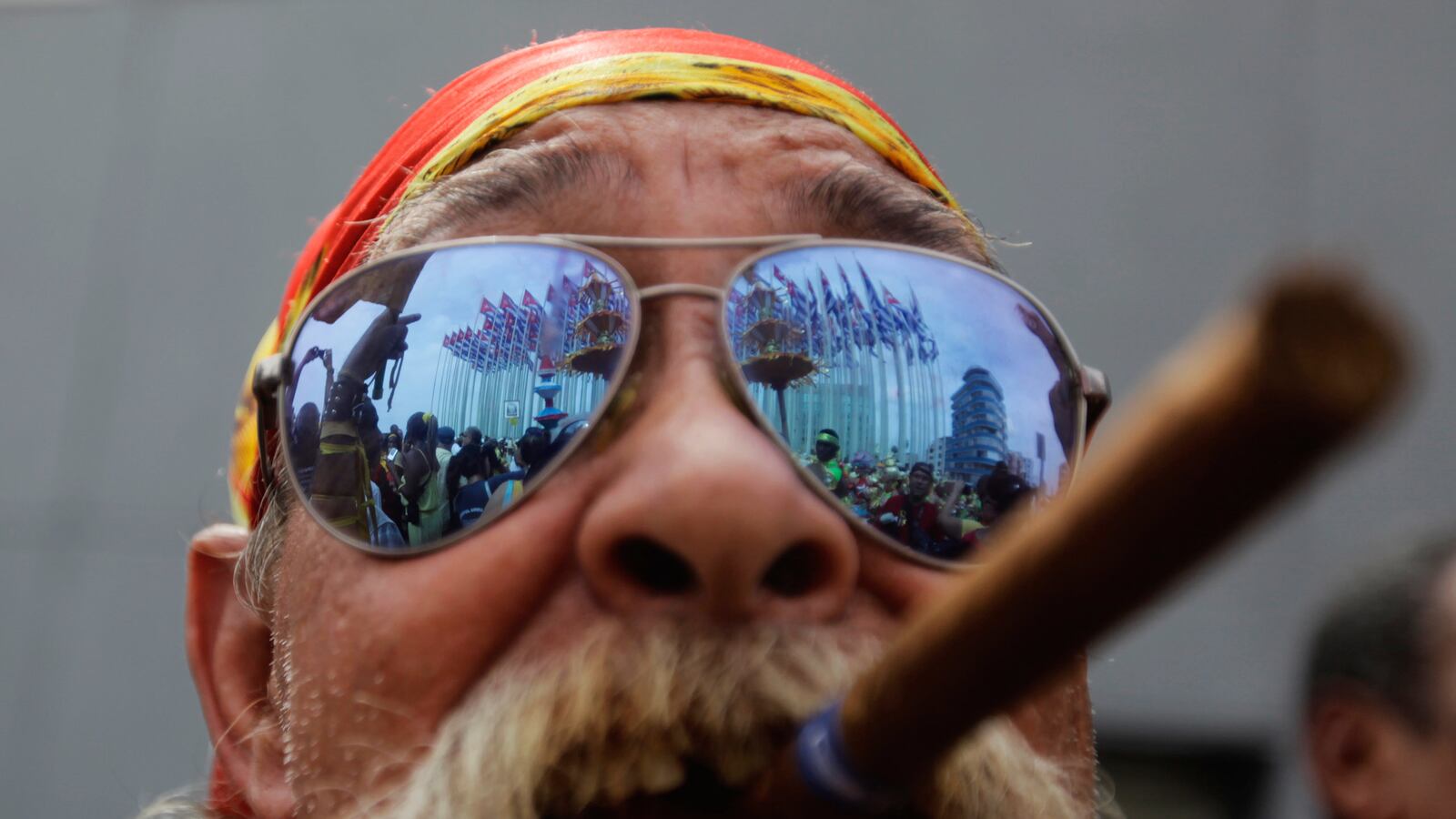When President Obama travels to Cuba next week, he’ll not only be following in the footsteps of Republican Calvin Coolidge (the last president to visit there), he’ll be accompanied by a living, breathing member of today’s GOP: Sen. Jeff Flake of Arizona, who has been calling for an end to American travel-and-trade restrictions since he was elected as a congressman in 2001.
As it happens, I traveled to Cuba a few weeks ago with Flake and a group put together by the Reason Foundation, the nonprofit that publishes the website which I edit. At the risk of celebrating a politician—which for a libertarian like myself is a nauseating idea—it’s worth taking note of the 53-year-old Flake’s long, principled commitment to normalizing relations with Cuba. He’s done so despite the ire of his own party (and more than a few Democrats) because he believes in free trade and free travel for us all. In this, he’s an inspiring example of putting partisanship aside not only to make Americans a little bit more free but to potentially liberate desperate Cubans from one of the most despotic regimes in the Western Hemipshere.
Both the United States and Cuban governments have loosened travel restrictions over the past year or so, and our group’s main goal was to see the Castro brothers’ personal island prison before it eventually—if belatedly—ends its self-imposed exile from wealth and prosperity (the typical Cuban takes home just $20 per month). Flake related a conversation he’d had a few years ago with the Polish anti-communist Lech Walesa.
“I have no idea why you guys have a museum of socialism 90 miles from your shore and you won’t let anybody visit it,” the Solidarity leader complained, shaking his head.
The first thing to understand, Flake stressed during an interview conducted on our trip, is that the travel ban, trade embargo, and other restrictions that were first put into place back during the Eisenhower and Kennedy years “aren’t sanctions on Cubans, these are sanctions on Americans.” When the Cuban government was “exporting revolution around,” he continued, “there was a good case for a trade embargo, but there was never a good case in my view for an outright travel ban. Or having Cuba being really the only country in the world where your government tells you you can’t go.”
That attitude doesn’t sit well with his fellow Republicans or Democrats such as Sen. Bob Menendez, who has called Obama’s normalizing of diplomatic ties a vindication of the Castro regime’s “brutal behavior.” That’s simply wrong, says Flake.
“When others who I normally agree with—Marco Rubio and others—say these latest moves by the president are a concession to the Castros or to the regime, they’re wrong. It’s not a concession to allow your own population to travel. That’s an expression of freedom. That’s how I’ve always viewed it,” he said.
Beyond that rights-based libertarian argument, Flake makes a pragmatic case, too. The embargo has been in place for nearly 60 years and what do we have to show for it, he asked rhetorically. Will another 60 years do the trick?
Flake argues that unilateral sanctions—the U.S. is the only country that categorically blocks trade and, until recently, most travel and remittances to Cuba—almost never work as intended. Flake knows this from doing Mormon missionary work in Namibia back in the 1980s, when that country was governed by South Africa and included in many of the investment and other sanctions leveled against that racist government. Multi-lateral sanctions are no silver bullet, either, though he says they did help to bring an end to apartheid.
One of the toughest unresolved issues between the United States and Cuba is the question of restitution. Flakes says that various tribunals have estimated that the U.S. property seized by the revolutionaries comes to around $8 billion in today’s dollars. About 5,000 of the smaller claims, he claims, can be settled for about $200 million while the rest are held by five or six big companies (sugar companies, the mining firm Freeport McMoran, and the old ITT). Wheels are in motion, Flake said, to move forward in novel ways.
“Starwood Hotels owns what was first ITT and then Sheraton, and so they have an outstanding claim against the Cuban government,” he said. “They are looking to do a hotel deal down here where it would put an American brand and manage hotels down here. In exchange, if they like that deal well enough, they will relinquish their claim that they have.”
Persistent human-rights abuses also present a stumbling block. Flake was involved in the release of Alan Gross, an American imprisoned in Cuba for five years, and he described returning to U.S. airspace with the USAID worker as one of the most exhilarating moments of his life. Flake doesn’t minimize these issues any more than he does the historical rupture represented by the Castro revolution.
“If you can imagine being here in 1959 and seeing Castro roll in, turn toward the Soviet Union, and then expropriate property—or imprison or kill your parents—that is a very good reason for a long grudge, and I do understand that,” he said. “But at some point you have say, ‘What are our policies doing? Are they helping that regime stay in power? Are we giving them a convenient excuse?”
And so Flake will be accompanying Obama on a historic trip to Cuba. This trip in and of itself will not reset U.S.-Cuban relations to a new year zero or anything like that. But it does represent a moment of real change, one that bodes well ultimately for the future of Cubans, who will certainly become not only richer but freer via an influx of American investment and attitudes about individual rights and freedom of expression.
And to the extent that a Republican senator’s involvement and support for an initiative headed up by a Democratic president represents the triumph of principle over partisanship, Jeff Flake’s next trip abroad sets a pretty good example for those of us back here at home, too.





